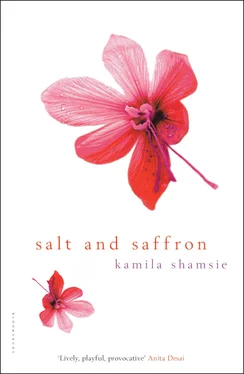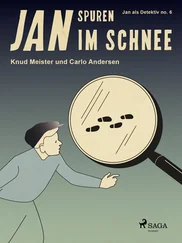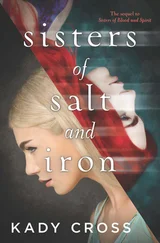‘Two,’ Dadi said. ‘So why are you calling?’
I turned to page two. OFFICIAL FLAYS FLIGHT FAILURE, ran the headline. The story below read:
Saboteurs are responsible for sabotaging the runway controls which caused chaos at Karachi airport yesterday, says an airline official. Further details will be unveiled when an enquiry has uncovered further details. Other sources say shady people were seen lurking near the control tower. When questioned by airport police they claimed they were not lurking but loitering. When this reporter asked the airline official if miscreants were involved, the official responded, ‘We have not yet looked into the creant factor.’
‘Little Usman!’ I said. ‘Never realized he had the Dard-e-Dil humour gene.’ Dadi’s earlier remark struck me for the first time. ‘Did you say, “So why are you calling?” Can’t I call you on a whim?’
‘Well, we haven’t really clarified that, have we? Or should I say, you haven’t decided whether we’re friends again yet.’
‘I love you Dods.’ I’d been wanting to say that ever since I heard her footsteps in the hall, the morning after I had returned home.
‘That’s not quite the same thing.’
‘We’re friends, so long as we don’t talk about Mariam Apa.’
‘A strange kind of friendship.’
‘We’re a strange kind of family.’
She laughed. ‘All right. For the moment, all right. So you’re really just calling on a whim?’
‘Well, no.’ I felt light-headed with relief that we’d got that conversation so painlessly out of the way. ‘Who are Zain and Ibrahim?’
She made a noise of exasperation. ‘Have you forgotten everything? Ibrahim and Zain …’
‘Oh, Ibrahim and Zain! Now I remember. Thanks Dadi. I have to go. There’s a letter I’m trying to understand. I’ll come over this evening, is that okay?’
‘Yes, fine. There are still lemon tarts left over. I’ll see you at five.’
Ibrahim and Zain. Of course I remembered them. They were one of the not-quite pairs. Their father, Nawab Assadullah, had two wives. One was high-born; the other was the Nawab’s favourite. But he couldn’t have been entirely discriminatory in his treatment of his wives because they were both found to be pregnant within days of each other. For months the court was gripped by rumour and speculation, and a lot of heavy gambling. Which of the wives would bear a son? If both, which would bear a son first?
Cliques formed around each wife, praying, fasting, bringing unguents and holy water from distant lands (those were less prejudiced times — distant lands were trusted). Mid-wives were consulted. What was the earliest a child could be induced without greatly reducing chances of survival?
Sometime around the seventh month of the pregnancies, the high-born wife’s father, cousin and Vizir to Assadullah, could take the anxiety no longer. He swallowed a diamond and waited for the sharp edges to lacerate his insides and catapult him into the embrace of an afterlife without intrigue. It didn’t work. After a few minutes of lying in bed feeling mildly uncomfortable, the Vizir got up, drank a glass of water, and realized that his father — a man who lost all sense of judgement at the mere sight of a pack of cards — had gambled away the family jewels, cunningly replacing them with fakes so as to avoid detection by his wife. With his fortunes lost and the future holding a fifty percent possibility of bleakness for his family, there remained only one course of action for the Vizir.
That afternoon, a midwife, her pockets heavy with diamonds and pearls, entered into the presence of the high-born wife. Within minutes the word went round the palace: she was in labour.
Another midwife was summoned to a different part of the palace, and for the rest of the night the courtiers couldn’t move anywhere without tripping over someone prostrate on a prayer mat. At dawn, at opposite ends of the palace, two umbilical cords were snipped; two premature sons were born. One must have been born first, if only by seconds, but no one was ever to know which. Two sons. Brothers. Princes. Twins? Well, no. But sort of.
Nawab Assadullah declared that Zain, the son of the favourite, was his heir, and Ibrahim, the other son, was not. But he showered the Vizir with money and jewels all the same, and when the old man tried diamond suicide again he died smiling.
So where’s the calamity?
Assadullah died in 1525. Zain ascended the throne. The next year was 1526. The year of the Battle of Paniput and the beginning of Mughal rule in India. Zain, sent his envoys to Babur, founder of the Mughal Empire, shortly after the battle. The envoys found a man who spoke not of wars or empires, but of melons. Read Babur’s memoirs if you want confirmation. To him, India was an ‘unpleasant and unharmonious’ place, a second-best territory he’d settled for when it seemed clear he would never again rule over his ancestral home and one-time kingdom, Samarkand. He was, in modern parlance, homesick. This homesickness manifested itself primarily in his yearning for the honey-sweet melons of Central Asia. (A great deal of attention is paid to fruit in the Baburnama and, by and large, India failed to impress Babur in that all-important regard. While he appreciated the mango he thought it unworthy to be considered, among all fruit, second only to the melon. Still, at least the mango fared better than the jackfruit — which, he wrote, ‘Looks exactly like sheep intestines turned inside out’ — and the fruit of the clustered fig — ‘an oddly insipid fruit’.)
Zain had heard of Babur’s homesickness and so he sent his envoys with this message: ‘I, too, am from the Timurid family, and there are many still in Samarkand and Bukhara who tremble in awe at the name of my ancestor, Nur-ul-Jahan, founder of Dard-e-Dil, a prince of Transoxania by birth. We are brothers, you and I, and brothers must help brothers. My armies are at your disposal to recapture Samarkand, land of fabled beauty and honey-sweet melons, where the power of the Uzbek is weaker than it outwardly seems. In return, I ask only that I may administer your lands in Hindustan, and rely upon you to help me defeat the infidel forces of Rana Sanga.’ (I blush, of course, to know my ancestor used the religion card to claim an alliance.)
The throne of Samarkand in return for his portion of India? Babur did not hesitate to say, ‘Let us meet, my brother, to talk of this.’ Zain’s envoys galloped home to find Zain assassinated, and Ibrahim on the throne. By the time Ibrahim had consolidated his position and cooled his rage towards his brother sufficiently to realize what a brilliant offer Zain had made the Mughal, Babur had decided that a mango in the hand was worth two melons in his dreams. I did not intend for that to sound vulgar.
Dard-e-Dil was absorbed into Mughal territory soon after, with little fuss or fanfare, and spent most of the next two centuries reduced to an administrative unit of the Mughal empire.
‘Those Johnny-come-latelies,’ my relatives are wont to say when the Mughals are mentioned. ‘You know, their empire could have been ours. Those not-quites!’
(And here, again, we must pause to account for the history books which show that the Mughals were certainly not willing to allow powerful rulers to remain powerful once the Mughal Empire was established. And Dard-e-Dil was a northern state, not one of the Deccan kingdoms out of Mughal reach. So why don’t we hear of any marriage alliances — except fairly minor ones — between the Mughals and the Dard-e-Dils? Why don’t we hear of Mughal plans to cut the Dard-e-Dils down to size? Before answering those questions, consider this one: Why don’t we see the kingdom of Dard-e-Dil on maps of pre-Mughal India? The truth, according to the history books, is this: the founder of Dard-e-Dil, Nur-ul-Jahan, was indeed from the royal Timurid line, but after his victory in the Battle of Surkh Khait he failed to consolidate his power, and the Dard-e-Dils remained minor figures in the power game, so minor you wonder if Babur could have taken Zain’s proposal seriously, so minor it’s no surprise the Mughals allowed the Dard-e-Dils (on an on-again, off-again basis) to administer the land which Nur-ul-Jahan and his descendants sometimes held and sometimes didn’t in the years between Surkh Khait and Paniput. The sad truth is that Nur-ul-Jahan’s so-called kingdom was little more than a patch of land and it was only after the fall of the Mughals that his descendants gained control of enough of the surrounding areas to claim real power (and to confer upon their ancestors the posthumous title of ‘Sultan’ which those early Dard-e-Dils never really held in their lifetimes — and later, when the British invented the term ‘Nawab’, the Dard-e-Dils decided they preferred that title, and airily replaced ‘Sultan’). That’s what the history books say, but they also acknowledge that the Dard-e-Dils were among the first northern kingdoms to throw off Mughal rule, soon after the eighteenth century had dawned and Aurangzeb, the last Great Mughal, had died, which is not explicable if they really were as insignificant as the historians make them out to be. Who says it’s true just because it’s in print?)
Читать дальше












